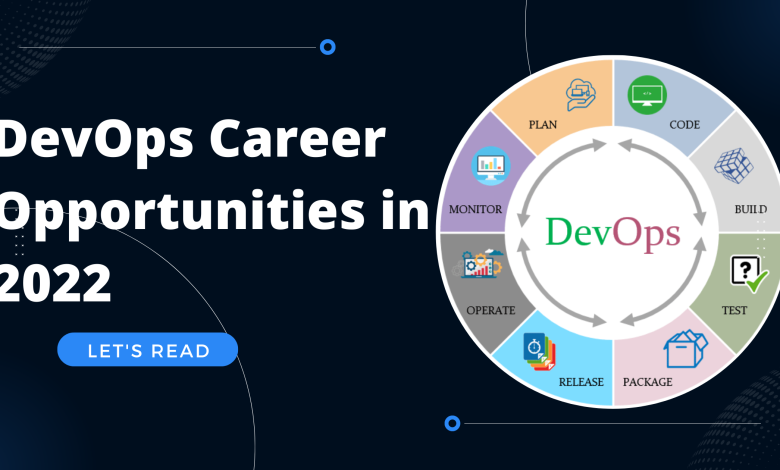
Introduction:DevOps Career Opportunities in 2022
DevOps gained popularity in the IT sector in 2015. While it is still in its evolving stages, DevOps is the next hot trend in the IT field. Therefore, it is no surprise that there will be no decrease in DevOps job opportunities in companies anywhere in the world.
DevOps, reduces the gap between software development and infrastructure operations.
Therefore, it serves as an unprecedented boost for cloud and DevOps Engineering career opportunities for engineers who are looking to expand beyond their usual skill set as software professionals.
DevOps Career Path
It is found that Organizations that implement DevOps are able to deploy their codes 30 times faster compared to their competitors.
Analyzing this high success rate and growth in companies that have gone through early adoption of DevOps, more and more organizations are opening up to the idea of adopting the practice leading to more DevOps job opportunities.
DevOps Roles and Responsibilities
Even though the skills, roles and responsibilities of a DevOps engineer are similar across roles, there are still some subtle nuances that set these DevOps career opportunities apart from each other.
Here are the most popular DevOps job opportunities.
-
DevOps Architect
Typically a DevOps architect defines a systematic solution for an organization which fits best across the technical, operational, and management standards. They generate an organized solution after a crucial examination of the large system environment and selecting an application framework to deal with the difficulties in the given system. A DevOps architect must be capable of handling all the issues by following the DevOps best practices.
Generally, a DevOps architect must have prior experience and knowledge in working with software developers, software architects, etc. DevOps architects are in much demand nowadays as they possess in-depth knowledge of all the DevOps stages and concepts. They have practical work experience in dealing with DevOps, operations, configuration, leadership roles, etc.
Responsibilities of a DevOps Architect
- DevOps architects are responsible to automate the process with proper tools.
- Developing DevOps channels throughout the organization.
- Evaluating, implementing and streamlining DevOps practices.
- Build an environment to accelerate software deployment and development
- Engineering general and effective processes.
- Helping operation and developers teams to solve their issues.
- Supervising, Examining and Handling technical operations.
- Providing a DevOps Process and Operations.
-
Release Manager
Within a DevOps team, the release manager plans, schedules, monitors and controls the software development and production deployment processes.
Release Managers ensure the release of your software by improving the communication and collaboration between the developers and the operations team.
The release manager will be responsible for the Release Management lifecycle that involves the stages such as scheduling the release, coordinating between teams, and deployment of release as per the schedule and within budget. DevOps Release Manager will release the software after completing the testing stage and deployment stage, and work closely with the application development team, testing team, and production team. They will maintain proper coordination between these teams to update the project-related information.
Release Manager Roles and Responsibilities:
- Plan the release of project deliverables
- Communicate between different teams for the project-related tasks
- Coordinate the release schedule and resources
- Identify the risks that can delay the release and management of software
-
Security Engineer
In a DevOps environment, security is known as DevSecOps. This is applied throughout the lifecycle of the software development process. A security engineer uses log and configuration management to ensure that there is security across the different stages of the software development process
What is DevOps Security?
DevOps security combines development, operations, and security. The main goal is to remove any barriers that may exist between software development and IT operations.
DevOps follows a continuous deployment strategy. Development teams can add features and fix bugs so that software can be released continuously in faster cycles without disrupting the user’s experience and business operations.
Security can become a large area of concern because developers often lean on programs, frameworks, libraries, and software development kits (SDKs) developed by third parties outside the organization. Third-party code may contain a security vulnerability that may or may not resolved prior to a developer using it.
When developers and IT teams work in close contact, the software is released with fewer errors. Further, each group in the software development process can consider the needs of the other when planning new features and rollouts. Indeed, the DevOps job role has transformed the culture of software development Development and the IT Industry.
What is DevSecOps?
DevSecOps is a method that incorporates security into the software development process. The fundamental concept is that security is shared by both software developers and IT administrators by integrating automated security tasks into DevOps processes.
In the past application, security was not a priority for developers. Security usually came after application development. The antivirus programs and firewalls— built by others and installed by customers—use to create a secure IT environment
However, a rise in the number and sophistication of cybercrime exposed vulnerabilities in individual products and applications. These engineering and IT department unite to build security measures into applications early on in the development process and then continuously as new features and new releases were rolled out.
DevOps Security Best Practices
- Embrace a DevSecOps Model
- Policy and Governance
- Automate Your DevOps Security Processes and Tools
- Comprehensive Discovery
- Vulnerability Management
- Configuration Management
- DevOps Secrets Management
- Privileged Access Management (PAM)
- Segment Networks
Build Your Devops Career through IPSR
IPSR solutions is providing Cloud and DevOps Engineering course. This can help you acquire the skills and knowledge needed to take on highly coveted jobs in the DevOps domain. During the course time, you will get hands-on experience in working with various DevOps tools, deploying automation and creating synergies between the software development and operations domains, making you an expert in implementing DevOps practices in real-world scenarios.



